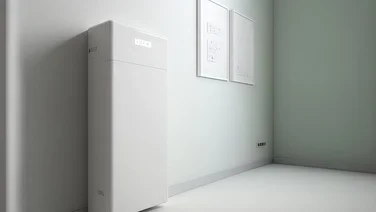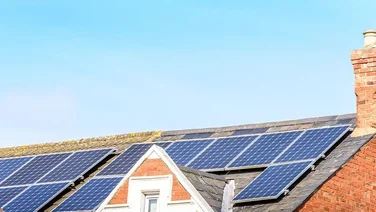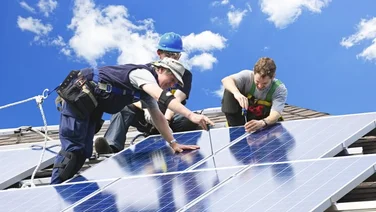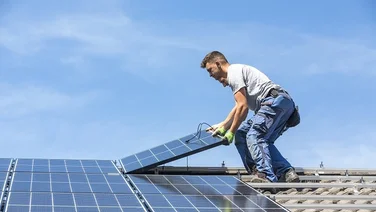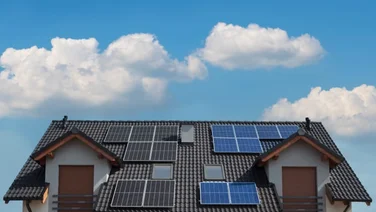We receive a small fee from trusted installers when you request a quote through our site. This helps us keep our content independent, well-researched and up to date – Learn more
- Solar panels work in all seasons, they just need direct or indirect sunlight
- Solar panel output reduces by an average of 83% in winter compared to summer
- In winter, tilting panels at a steep angle can help them produce more electricity

It’s a common question: do solar panels work in winter? You want to make sure you’re getting your money’s worth, especially when daylight hours shrink.
We’ll answer all your questions about solar panels in winter in this article, covering whether they work in winter, how reduced daylight hours affects solar panel performance, and what steps you can take to optimise performance during this season.
Ready to take the plunge and get solar panels? Just fill in our short form with a few details. We’ll then pass them on to expert solar panel installers, who’ll reach out to you with free quotes.
Where do you want to install solar panels?
Get startedDo solar panels still work in the winter?
Yes, solar panels work in the winter. In fact, solar panels can generate electricity in almost any type of weather.
Cold weather doesn’t affect solar panel performance (unless temperatures go below -40°C), since they operate on sunlight, which is still available in winter in the UK – albeit, at much lower levels than in the summer.
This is one reason why solar panels generate less electricity in winter – the days are just shorter.
There also tend to be more cloudy days in winter, which can reduce the solar panels’ output. Solar panels can still capture sunlight when it’s overcast, but on partially cloudy days they’ll produce roughly 80% of their maximum output, according to the Environmental and Energy Study Institute.
It’s important to take this into consideration when buying solar panels. After all, electricity requirements go up in the winter months especially if you have an electric heating system, such as a heat pump. Darker days mean the lights stay on for longer, and cold weather means the heating goes on.
However, there are some advantages to having solar panels in the winter. For starters, it can get too hot for solar panels in the summer – with solar panel efficiency starting to reduce as temperatures reach above 25° Celsius (°C). This isn’t an issue in the winter, since temperatures in the UK stay between 2°C and 7°C, on average.
Does solar panel performance drop in the winter?
Solar panel performance drops during the winter months because the days are shorter, the sun is lower in the sky, and the weather is more overcast. This means the solar panels are exposed to less sunlight, which means they’re unable to generate as much electricity as they do on long, sunny days.
According to our calculations, solar panel output decreases by around 83% in the winter compared to the summer.
To give an idea of what that means, a standard 3.5 kilowatt (kW) solar panel system will produce around 362-kilowatt hours (kWh) of electricity per month during the summer. In winter, that drops to 52 kWh.
Do solar panels still work in snowy weather?
Solar panels still work in snowy weather, but the amount of electricity they can generate will depend on how much snow has fallen.
Heavy snowfall – a rarity in the UK – can stop solar panels from working altogether because the thick layer of snow will prevent light from reaching the solar cells.
The weight of heavy snow can also damage the solar panels, by straining their supporting frames and causing microcracks in the face of the panel.
If you’re worried about this, you should check the datasheet that comes with your solar panels, as this often indicates how much snow the panels can withstand.
Light snowfall, which is much more common in the UK, won’t have a significant effect on the solar panels’ efficiency, since it’s not thick enough of a layer to block out light and tends to melt quickly.
Once the snow melts, it can actually help your solar panels work more effectively by cleaning dirt or debris off them.

What’s the best time of year for solar panels?
The best time of year for solar panels in the UK is between May and July because these months have the longest daylight hours, with days typically lasting 15–16 hours.
There’s also less rain – and therefore fewer cloudy days – from May to July, meaning solar panels get more direct sunlight. For example, May averages 11 days of rainfall, compared to 16 days in November.
On the opposite end of the spectrum, the worst time of the year for solar panels in the UK is from November to January. Daylight only hangs around for about 8 hours during this period, with unsettled, cloudy weather becoming much more likely in these months.
Where do you want to install solar panels?
Get startedHow big is your solar panel system, and how roughly much did it cost?
“We have a 5.76 kilowatt (kW) system, comprising of 16 360 watt (W) fully black Canadian solar panels. They’re connected to a Solis 5G 5.0 kW dual tracker inverter, with direct current (DC) isolation […].“We paid just under £5,000 for the whole system, and £750 for an electric car charging port.”
Do your solar panels generate enough power to cover all your electricity needs?
“I would say that they cover half of our electricity needs, or up to two thirds. Obviously when there is more sun, we are better off.“We have a smart meter, and I see it set to zero a lot of the time.”
Are you receiving money via the Smart Export Guarantee?
“We are with Octopus Energy, and I think we get 9p per kilowatt hour. We signed up for the Smart Export Guarantee when we signed up with Octopus.”
Melissa lives in the East Midlands, and has owned solar panels since July 2022.
How to optimise solar panel performance in winter
There are a few things you can do to optimise your solar panel performance during winter, including:
- Facing your solar panels southward – This will expose them to the most hours of direct sunlight if you’re based in the UK. This is true in both winter and summer, but it’s especially important in winter, when daylight hours are few and far between
- Tilting your solar panels at a steeper angle – During the winter, the sun stays low in the sky for longer, so a steep angle – around 60° – will expose the panels to more direct sunlight
- Clearing away heavy snow – Heavy snow should be cleared from your solar panels as soon as possible. The longer you leave it, the more electricity generation you lose out on
- Using more electricity during the day – In the UK, daylight hours during the winter are between 8am and 4pm, and this is when your solar panels will be producing electricity. Doing electricity-intensive activities, such as running the washing machine or dishwasher, during the day will help you use more of your solar panels’ electricity
- Using a solar storage battery – A solar battery can store electricity generated from your solar panels during the day, which would otherwise be exported back to the grid. This means that you can use the electricity your panels have generated in the day, during the evening
One of the most common questions we get asked is: are solar batteries worth it? In short, the answers is definitely yes. To find out why, visit our dedicated page.
Of course, not everyone is able to change their solar panels’ angle and direction, since most solar panels are installed on fixed frames. And not everyone can stay home during the day.
If that’s the case, don’t worry. By participating in the Smart Export Guarantee (SEG), you’ll still get some use out of your solar panels without these measures. With the SEG, you can get paid for the solar electricity you don’t use during the day.
Next steps
Solar panels definitely work in winter, but they do experience a drop in performance – mainly because of reduced daylight hours.
That doesn’t mean they’re a bad investment though. In fact, the average UK homeowner will save around £483 per year on energy bills with solar panels, and make a profit of up to £6,000 over the course of the panels’ lifetime.
If that quelled your fears about solar panels, and you’d like to get some, we can help. All you need to do is fill in our short form, and we’ll put you in touch with professional solar panel installers who’ll provide their best prices.



